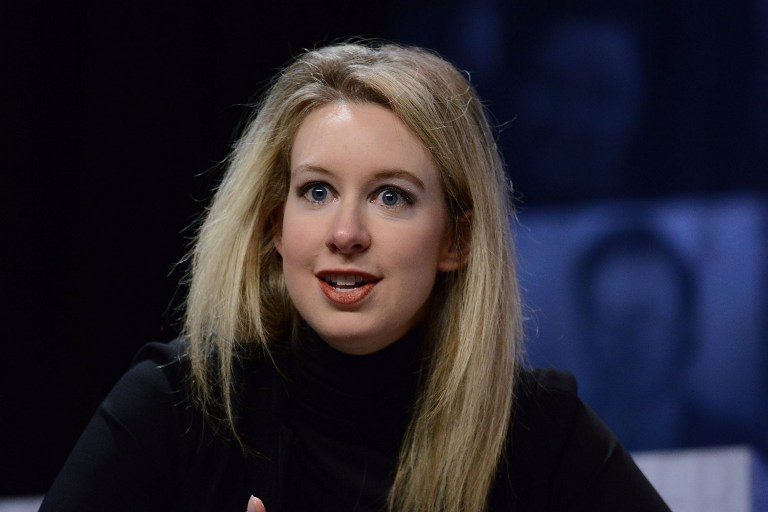SUMMARY
This is AI generated summarization, which may have errors. For context, always refer to the full article.

SAN FRANCISCO, USA – US securities regulators on Wednesday, March 14, charged the chief executive of the blood-testing company Theranos, Elizabeth Holmes, and a former president at the onetime soaring Silicon Valley startup with an “elaborate, years-long fraud.”
Holmes and Theranos made a deal to settle the case against them, with the penalty including her surrendering majority voting control of the company, according to a statement by the US Securities and Exchange Commission.
Founded in 2003 by Holmes when she was only 19, the company had been seen as a rising star but came under scrutiny after The Wall Street Journal published articles questioning the reliability of its technology.
Theranos, which had touted a new way of testing that uses far less blood and delivers faster results at much lower cost than traditional methods in US labs, had been under civil and criminal investigation over its claims.
The SEC charged Holmes and former Theranos president Ramesh Balwani with raising more than $700 million by exaggerating or lying about the business and its technology.
”As a result of Holmes’ alleged fraudulent conduct, she is being stripped of control of the company she founded, is returning millions of shares to Theranos, and is barred from serving as an officer or director of a public company for 10 years,'” SEC enforcement division co-director Stephanie Avakian said in a statement.
Holmes will also pay a $500,000 fine as part of the settlement, according to the SEC.
“The company is pleased to be bringing this matter to a close and looks forward to advancing its technology,” the Theranos board of directors said in a statement.
Theranos and Holmes cooperated with the SEC investigation, and she will return approximately 18.9 million shares of stock as a result of the settlement, according to the startup.
Enforcement division co-director Steven Peikin said during a conference call that the SEC intended to litigate the case against Balwani, seeking a range of sanctions against him.
Holmes was seen for a time as a rising star in Silicon Valley, appearing at events like the Women In Technology and Politics dinner hosted by Glamour and Facebook, the Vanity Fair New Establishment Summit and events hosted by the Wall Street Journal and TechCrunch.
Hopes versus truths
The SEC is not taking aim at the startup itself, which last year was near bankruptcy and recently obtained a loan to survive, according to Peikin.
“This company was really a two-person operation, with Holmes and Balwani in exclusive control and responsible for the conduct,” Peikin said
Punishing the startup would further harm investors the SEC is aiming to protect, he said.
Holmes and Balwani pitched a tale in investor presentations, product demonstrations, and media articles about the startup’s key product — a portable blood analyzer — which they claimed could revolutionize the industry by inexpensively conducting comprehensive tests from drops of blood from fingers.
Theranos only analyzed a small number of blood samples on its own equipment, having testing done on standard industry equipment developed by other companies, the complaint contended.
“‘The Theranos story is an important lesson for Silicon Valley,” said SEC San Francisco regional office director Jina Choi.
“Innovators who seek to revolutionize and disrupt an industry must tell investors the truth about what their technology can do today, not just what they hope it might do someday.'”
SEC complaints also charged that Theranos, Holmes, and Balwani claimed that the startup’s products were deployed by the US Department of Defense on the battlefield in Afghanistan and on medevac helicopters, and that the company would generate more than $100 million in revenue in 2014.
Theranos technology was never deployed by the US Department of Defense and generated a little more than $100,000 in revenue from operations in 2014, according to the SEC.
A settlement with the SEC does not preclude criminal charges from being pursued by US prosecutors, but Peikin declined to comment whether any other agencies were investigating the case. – Rappler.com
Add a comment
How does this make you feel?
There are no comments yet. Add your comment to start the conversation.